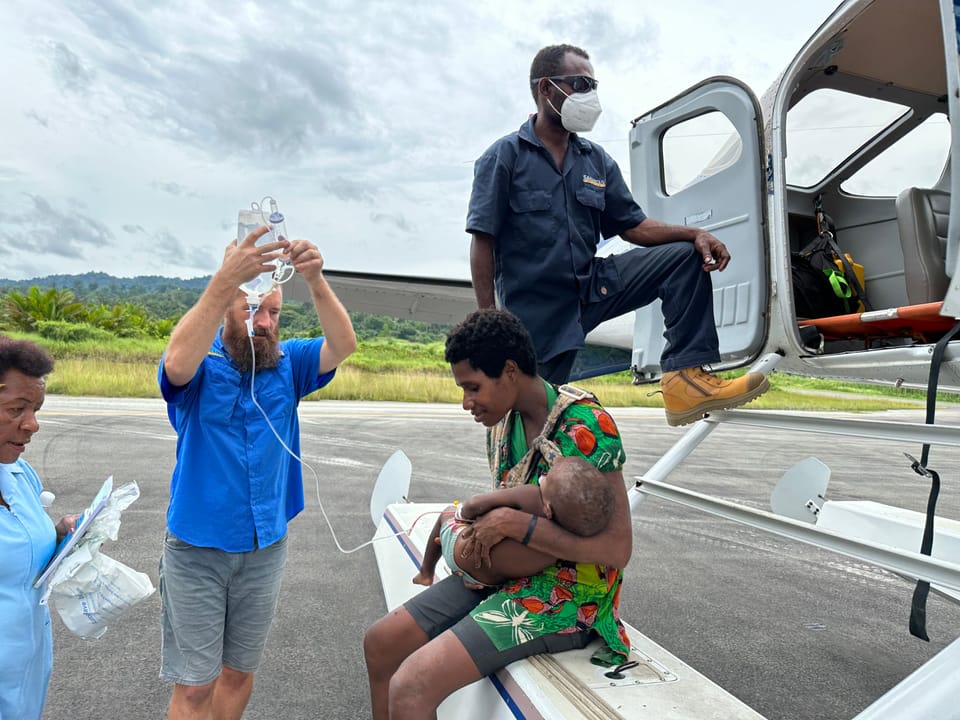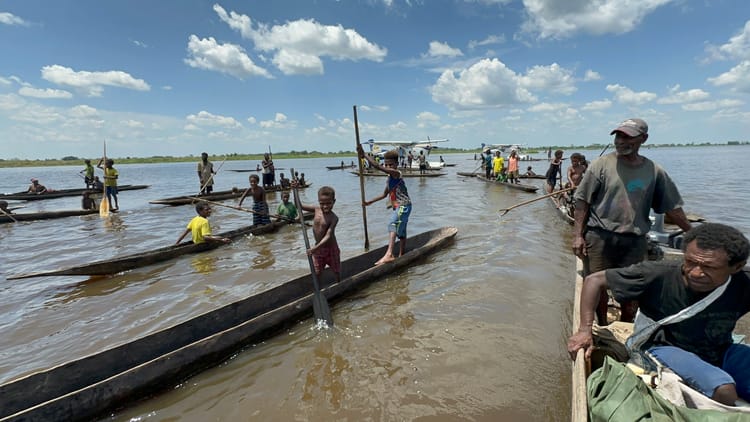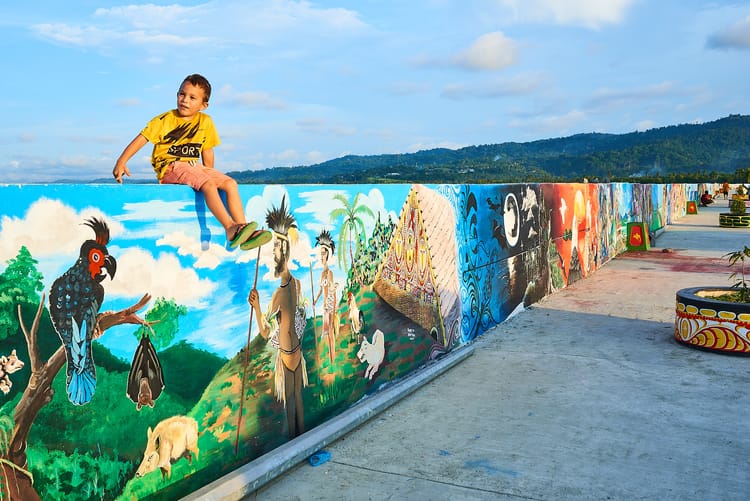Dying From Boredom Is Entirely Preventable

Every Monday afternoon Janice swings by the hangar and I throw my wrenches down and hop into the van so we go visit some sick people. If you want a consistent prayer point, there it is. Mondays we go to the haus sik. Of course, if you wait until Monday to pray, it'll be Tuesday here and we'll be done with haus sik already. So Sunday would be a good day. Thanks for that, unless you're not doing it, then never mind.
Some patients don't have to stay in the hospital long. Take snake bite patients. They cause the most drama because every second counts. We'll rush to the haus sik, pick up a doctor who can administer anti-venom, and then hurry to the hangar where the airplane is sent off in a whirlwind of burnt avgas, kind of like Elijah's chariot. The plane will come back and as you're unloading the patient you'll be thinking to yourself, there's no way this person can make it. Sometimes their eyes are rolled back in their head. Usually they're unresponsive. And tragically sometimes they don't make it. We had a snake bite victim pass away in the plane just a couple weeks ago. But, if the antivenom is given in time, they'll snap back in a miraculous way. Typically they're discharged the next day or so.
One of the most profound moments I had in haus sik was visiting a young boy who was bitten by a death adder. He was bitten just the day before and when we unloaded him he was laboring to breathe and was unresponsive. And yet here he was the next day - smiling, happy, and eagerly unwrapping the lollipop we had given him. He was a perfectly healthy boy. In fact, they were to be discharged in a few hours. And as we sat there and talked with his mother the realization washed over me that if the airplane wasn't working that day, this mother wouldn't be here smiling and talking to us about her village, her garden, and how many children she has. Her heart, and those of this boy's family back home, would instead be shattered by loss. And for a moment it was like I was talking to someone who had come back from the dead, because, statistically, they did. You shouldn't survive a death adder bite in the bush of Papua New Guinea, especially as a child.
Death adders were originally called "Deaf Adders" because people thought they couldn't hear. This came from their reluctance to move or get out of the way if you happened upon them. Turns out they can hear just fine, they just don't care. Eventually, because either people heard the name wrong or because the snakes weren't actually deaf, the name changed to "Death Adder." Most poisonous snakes will only inject poison about 50% of the time, so there's a chance that if you get bitten by one, you won't actually get poisoned (it still ruins your day, though). The problem with death adders is that they inject venom into their victims 90% of the time and, just for good measure, their fangs are extra long, which means they inject the venom closer to major blood pathways.
Snake bite victims always give us dramatic stories of life and death and highlight the life saving, time critical nature of what we do. But, since they recover so quickly, we don't get to visit them much. Other patients take longer to recover and so we'll have more time to build a relationship with them.
Take Megjoe and his "wasman" Frankie, for example. A wasman (or wasmeri, if it's a woman) is a person who stays with the patient and assists them. In the States the hospital gives you a full service stay. Here, not so much. The hospital provides two meals a day for a patient and one "was". They don't help the patient get dressed or take showers or go to the bathroom or even bring meals. That's the wasman's job. The wasman waits in the food line, goes to the local market to get things they need, and even sleeps by the patient's bedside, hanging out with them so the patient doesn't die of boredom. It's disheartening to have a patient heal from tuberculosis or some other horrible condition only to die from boredom a week later. Although Papua New Guinea folks seem more immune to boredom than Americans, they still don't mind a little entertainment from time to time. They love getting visitors!
As we "talked story" with Megjoe and Frankie, I found that they live in a village called Hauna. Hauna is a village just off the Sepik River. Megjoe began to develop painful sores on his hands and feet, essentially crippling him. While his condition wasn't life threatening, we do occasionally transport non-critical patients if we fly near their location during a medical delivery or other routine flight where we'd be returning empty to Wewak.
Megjoe and Frankie know some English because missionary sisters from Indiana served in their village for forty years and gave them some informal lessons. It's a small world.
Megjoe has been in the hospital for six months and will likely be here for several more. His sores are slowly drying up and healing. His brother has been here by his side the whole time. They're always so grateful for a visit. As soon as I pop through the door in the ward and catch Megjoe's eye, a soft smile will spread across his face as he sits up a little straighter and waves a bandaged hand. The other day I asked him if I could take his picture and, before he agreed, he carefully put on his Dominoes Pizza shirt, and then gave the go-ahead. He always thanks me for visiting him as profusely as if I'd given him a kidney, which is an enthusiasm level that is unnecessary but still appreciated.
One time I told him I'd buy him a puzzle to put together so he's not so bored. As I was shopping for a puzzle with Janice, Janice asked me a pertinent question, " How's he going to put it together?"
That's when I remembered he had bandages on both his hands. What an insensitive gift. I might as well give him a harmonica or a Rubik's cube or a typewriter. So I bought him a new duffle bag because the zipper on his was broken. Still, I don't know how entertaining a duffel bag can be. The best entertainment is conversation.

"So how much does it cost to get to Hauna?" I asked, curious because we have some friends in the bush we'd like to go visit. Plus, I was trying to come up with something to talk about. I'm terrible at small talk.
According to Frankie, it takes almost an entire 55 gallon drum of fuel and a whole day of travel just to get a boat to Pagwai, which is where they get off the river. Although the cost of that fuel is split up between all the passengers, it's still a big financial burden. The next day they get on a PMV (public transport) and ride another day to get to Wewak. The trip is very expensive and takes two days to accomplish, if it all goes well. It could easily take longer. To put the price of the trip into perspective, often we'll find families struggle to afford a bottle of medicine that costs K25, or about $7 USD. People who live in the bush live off of the land and do so quite comfortably but when it comes time to spend cash on something, well, I guess you could say money doesn't grow on trees here either.
For example, there was a family living at a local church who came in from the bush because their child broke his collarbone. They were here for several weeks after he was well, trying to save up enough money to travel back to their village. Often relatives come together and help share emergency medical or transport costs.
In fact, if the patient has "lain" (or relatives) in Wewak, they'll typically be waiting at our gate at the airport when the patient arrives, ready to ride along in the ambulance to the haus sik and assist. I did say that Papua New Guineans are more immune to boredom than Americans, and it's true, but they still don't like to be left out of the drama. And as more people get involved in any particular drama, the drama gravity grows and sucks even more people in.
One time we loaded up a patient in the ambulance and as I drove through our gate I met two guys outside who apparently knew the guy on the stretcher. I understood they were asking if they could come along. "Sure." I said, nodding my head, "Hop in." They hopped in and as they did I saw in my mirror people condensing out of thin air, like dew on grass. They started pouring themselves into the ambulance with an invisible funnel. The poor guy on the stretcher was outnumbered ten to one and had to grunt to a kneeling position on his stretcher. I started trying to communicate that the ambulance was full. I felt like that information should've been self evident but, just to reinforce my point, I put the ambulance in gear and started slowly moving forward, disconnecting the invisible funnel of people from the back doors of my ambulance. Some days I don't know what's going on.

Sometimes life here is hard. While trying to find a patient in the Haus Sik, we came across a toddler with his butt hovering above his bed because both legs were in traction, tied straight up to a rack above him. He was in a car accident and somehow had broken both legs. My children would go mad in fifteen minutes. He was there for a week or two. What can you do? Not much, but maybe a little. A few days later, Elliot gave one of his toy matchbox cars to the little guy. At least he has a car to drive around his bed now.
Sometimes life here is utterly tragic. We brought in a twelve year old girl in who had a broken femur. She was in traction for several weeks so the leg could be brought into a position where it could be set. Then, a day before the surgery was scheduled, the father abruptly decided to take his daughter back to their village because he was tired of taking care of her in the hospital. He didn't want to stay another week or two and wait for recovery. Options to prevent this were exhausted and so at the end of the day the father took his daughter who still had a broken femur back to their village, at best leaving her leg crippled or at worst causing further injury that would lead to her death. There are days when you've done all you can do and yet the worst still happens.
We really do get served triumph and tragedy, sometimes on the same plate. Why did God bless me with loving parents in a rich land? Why do other people grow up knowing nothing but tragedy? It's a question I ask a lot and I don't really know the answer. But there's one thing I know and that is that good things have happened to me that I didn't deserve. And bad things have happened to people here who didn't deserve them. I suppose the sensible thing is to use the blessings I didn't deserve to help someone through a tragedy they didn't deserve.
We add a lot of extra drama to our lives but going to the haus sik narrows my focus down to what really matters and it's then that I realize I have everything that matters.



